Related Research Articles

John Calvin was a French theologian, pastor and reformer in Geneva during the Protestant Reformation. He was a principal figure in the development of the system of Christian theology later called Calvinism, including its doctrines of predestination and of God's absolute sovereignty in the salvation of the human soul from death and eternal damnation. Calvinist doctrines were influenced by and elaborated upon the Augustinian and other Christian traditions. Various Congregational, Reformed and Presbyterian churches, which look to Calvin as the chief expositor of their beliefs, have spread throughout the world.
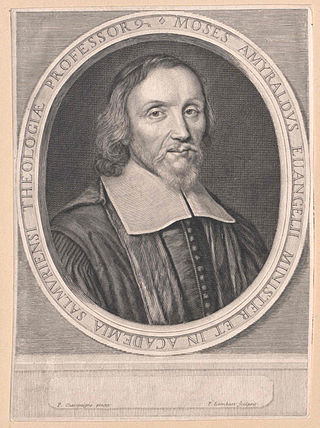
Moïse Amyraut, in English texts often Moses Amyraut, was a French Huguenot, Reformed theologian and metaphysician. He was the architect of Amyraldism, a Calvinist doctrine that made modifications to Calvinist theology regarding the nature of Christ's atonement and covenant theology.

Theodore Beza was a French Calvinist Protestant theologian, reformer and scholar who played an important role in the Protestant Reformation. He was a disciple of John Calvin and lived most of his life in Geneva. Beza succeeded Calvin as the spiritual leader of the Republic of Geneva.

Michel de l'Hôpital was a French lawyer, diplomat and chancellor during the latter Italian Wars and the early French Wars of Religion. The son of a doctor in the service of Constable Bourbon he spent his early life exiled from France at Bourbon's and then the emperors court. When his father entered the service of the House of Lorraine, he entered the patronage network of Charles, Cardinal of Lorraine. Through his marriage to Marie Morin, he acquired a seat in the Paris Parlement. In this capacity he drew up the charges for the king, concerning the defenders of Boulogne who surrendered the city in 1544, before taking a role as a diplomat to the Council of Trent in 1547. The following year he assisted Anne d'Este in the details of her inheritance to ensure she could marry Francis, Duke of Guise.

François Hotman was a French Protestant lawyer and writer, associated with the legal humanists and with the monarchomaques, who struggled against absolute monarchy. His first name is often written 'Francis' in English. His surname is Latinized by himself as Hotomanus, by others as Hotomannus and Hottomannus. He has been called "one of the first modern revolutionaries".

William Farel, Guilhem Farel or Guillaume Farel, was a French evangelist, Protestant reformer and a founder of the Calvinist Church in the Principality of Neuchâtel, in the Republic of Geneva, and in Switzerland in the Canton of Bern and the Canton of Vaud. He is most often remembered for having persuaded John Calvin to remain in Geneva in 1536, and for persuading him to return there in 1541, after their expulsion in 1538. They influenced the government of Geneva to the point that it became the "Protestant Rome", where Protestants took refuge and dissidents such as Catholics and unitarians were driven out; some of the Catholics and Unitarians were even killed for their beliefs. Together with Calvin, Farel worked to train missionary preachers who spread the Protestant cause to other countries, and especially to France.
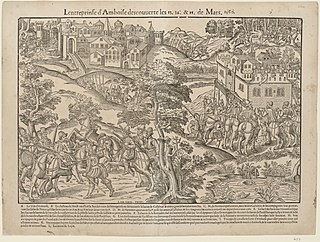
The Amboise conspiracy, also called Tumult of Amboise, was a failed attempt by a Huguenot faction in France to gain control over the young King Francis II and to reverse the policies of the current administration of Francis, Duke of Guise and Charles, Cardinal of Lorraine through their arrest, and potentially execution. Malcontent factions of Huguenots had been chafing under the French crown since the reign of Henry II and with the arrival of a new young king, saw their chance to take power for themselves. However the plot was uncovered ahead of time, and the Guise were ready for them. As such hundreds would be arrested, and many killed. Louis I, Prince of Condé was suspected of involvement, however he was able to flee south, and it was only after some months that the Guise were able to put him on trial. Shortly thereafter, the sickly Francis II died, their hold on the administration collapsed, and with it the conviction of Condé. This tumult would be one of the key steps in the collapse of crown authority that led to the first French War of Religion.

The Edict of Saint-Germain, also known as the Edict of January, was a landmark decree of tolerance promulgated by the regent of France, Catherine de' Medici, in January 1562. The edict provided limited tolerance to the Protestant Huguenots in the Catholic realm, though with counterweighing restrictions on their behaviour. The act represented the culmination of several years of slowly liberalising edicts which had begun with the 1560 Edict of Amboise. After two months the Paris Parlement would be compelled to register it by the rapidly deteriorating situation in the capital. The practical impact of the edict would be highly limited by the subsequent outbreak of the first French Wars of Religion but it would form the foundation for subsequent toleration edicts as the Edict of Nantes of 1598.

Sebastian Castellio was a French preacher and theologian; and one of the first Reformed Christian proponents of religious toleration, freedom of conscience and thought.
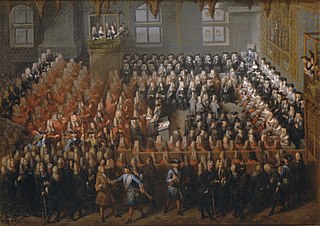
The Parlement of Paris was the oldest parlement in the Kingdom of France, formed in the 14th century. It was fixed in Paris by Philip IV of France in 1302. The Parlement of Paris would hold sessions inside the medieval royal palace on the Île de la Cité, nowadays still the site of the Paris Hall of Justice.
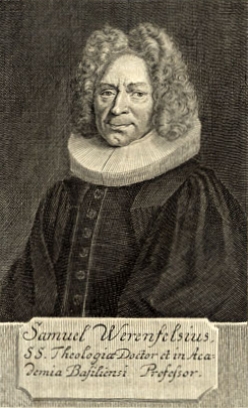
Samuel Werenfels was a Swiss theologian. He was a major figure in the move towards a "reasonable orthodoxy" in Swiss Reformed theology.
The Cappel family was a French family which produced distinguished jurists and theologians in the 15th and 16th centuries. The family also took the Latin name Tillaeus based on the fief le Tilloy.
King Francis I of France issued the Edict of Coucy on July 16, 1535, ending the persecution of Protestants on the ground that heresy no longer existed in France. It also released religious prisoners and offered amnesty to exiles, providing they abjure heresy.
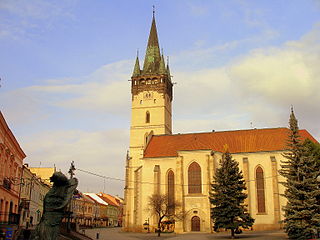
In 16th-century Christianity, Protestantism came to the forefront and marked a significant change in the Christian world.
André de Gouveia was a Portuguese humanist and pedagogue during the Renaissance.
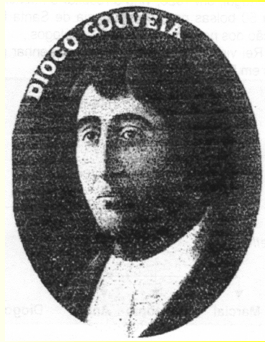
Diogo de Gouveia, known as Diogo de Gouveia, the Elder to distinguish him from contemporary homonyms such as his nephew, was a leading Portuguese teacher, theologian, diplomat and humanist during the Renaissance. With an extensive academic curriculum as rector at the University of Paris, he served King Manuel I and king John III of Portugal, whom he advised on the creation of captaincies in Brazil and the coming of the first Jesuit missionaries and notably Francis Xavier. First of a lineage of distinguished humanists and educators, he was the uncle of André de Gouveia, António de Gouveia, Diogo de Gouveia "the younger", and Marcial de Gouveia. During the Counter-Reformation he was a strong supporter of scholastic and Catholic orthodoxy, clashing with the liberal views of his nephew André de Gouveia.

The 1562 Riots of Toulouse are a series of events that pitted members of the Reformed Church of France against members of the Roman Catholic Church in violent clashes that ended with the deaths of between 3,000 and 5,000 citizens of the French city of Toulouse. These events exhibit the tensions that would soon explode into full civil war during the French Wars of Religion.

Wilhelm Heinrich Neuser was a German Protestant theologian, church historian, professor and a leading scholar in John Calvin research, a founder of International Congress on Calvin Research.
Michel Cop was a Swiss Protestant Reformer. He was brother of Nicolas Cop and friend of John Calvin.
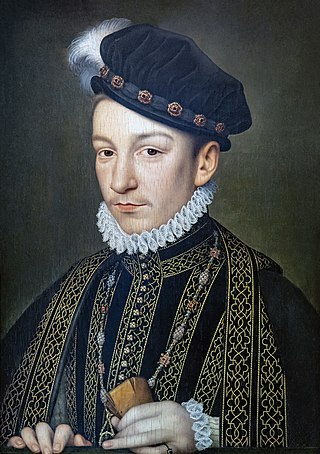
The Edict of 19 April was a religious edict promulgated by the regency council of Charles IX of France on 19 April 1561. The edict would confirm the decision of the Estates General of 1560-1 as regarded the amnesty for religious prisoners. The edict would however go further in an effort to calm the unrest that was sweeping France, outlawing the use of religious epithets and providing a pathway for religious exiles to return to the country. Despite not being an edict of toleration for Protestantism, the more conservative Catholics would interpret the edict as a concession to the Huguenots, leading to the Parlement of Paris to remonstrate the crown. The edict would be endorsed and furthered in the more sweeping Edict of July a few months later, before it in turn was superseded by the first edict of toleration, the Edict of Saint-Germain.
References
- Cottret, Bernard (2000), Calvin: A Biography, Grand Rapids, Michigan: Wm. B. Eerdmans, ISBN 0-8028-3159-1 Translation from the original Calvin: Biographie, Editions Jean-Claude Lattès, 1995.
- Ganoczy, Alexandre (2004), "Calvin's life", in McKim, Donald K. (ed.), The Cambridge Companion to John Calvin, Cambridge: Cambridge University Press, ISBN 978-0-521-81647-2
- McGrath, Alister E. (1990), A Life of John Calvin, Oxford: Basil Blackwell, ISBN 0-631-16398-0 .
- Parker, T. H. L. (2006), John Calvin: A Biography, Oxford: Lion Hudson plc, ISBN 978-0-7459-5228-4 .
- Nicholls, David (1996). "Heresy and Protestantism, 1520-1542: Questions of Perception and Communication". French History. 10 (2). Oxford University Press: 182–205. doi:10.1093/fh/10.2.182.
- "The Cop / Cope / Kob Papers" in possession of Marsha Cope Huie, M.A., J.D.; and LL.M. (Cantab. Hons.1986).
- Calvin, Johannes (1994), Reformatorische Anfange (1553-41), Neukirchen-Vluyn.